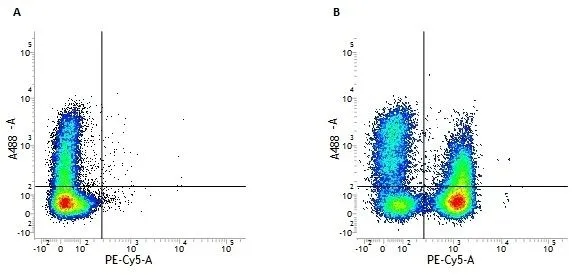
Figure A. A488 conjugated Mouse anti Human CD38 and RPE-A647 tandem conjugated Mouse IgG1 isotype control. Figure B. A488 conjugated Mouse anti Human CD38 and RPE-Cy5 tandem conjugated Mouse anti Human CD3 (GTX42102). All experiments performed on human Peripheral blood lymphocytes
CD3 epsilon antibody [UCHT1] (Low endotoxin, azide free)
GTX42102
ApplicationsFlow Cytometry, ImmunoHistoChemistry, ImmunoHistoChemistry Frozen
Product group Antibodies
ReactivityHuman, Primate
TargetCD3E
Overview
- SupplierGeneTex
- Product NameCD3 epsilon antibody [UCHT1] (Low endotoxin, azide free)
- Delivery Days Customer9
- Antibody SpecificityThis antibody binds to a region in the ectodomain of human CD3ε and has been shown to bind to a discontinuous epitope near an acidic region of CD3ε opposite the dimer interface.
- Application Supplier NoteFACS: 1/50-1/100. *Optimal dilutions/concentrations should be determined by the researcher.Not tested in other applications.
- ApplicationsFlow Cytometry, ImmunoHistoChemistry, ImmunoHistoChemistry Frozen
- CertificationResearch Use Only
- ClonalityMonoclonal
- Clone IDUCHT1
- Concentration1 mg/ml
- ConjugateUnconjugated
- Gene ID916
- Target nameCD3E
- Target descriptionCD3e molecule
- Target synonymsCD3e antigen, epsilon polypeptide (TiT3 complex); CD3e molecule, epsilon (CD3-TCR complex); CD3-epsilon; IMD18; T3E; T-cell antigen receptor complex, epsilon subunit of T3; T-cell surface antigen T3/Leu-4 epsilon chain; T-cell surface glycoprotein CD3 epsilon chain; TCRE
- HostMouse
- IsotypeIgG1
- Protein IDP07766
- Protein NameT-cell surface glycoprotein CD3 epsilon chain
- Scientific DescriptionThe protein encoded by this gene is the CD3-epsilon polypeptide, which together with CD3-gamma, -delta and -zeta, and the T-cell receptor alpha/beta and gamma/delta heterodimers, forms the T-cell receptor-CD3 complex. This complex plays an important role in coupling antigen recognition to several intracellular signal-transduction pathways. The genes encoding the epsilon, gamma and delta polypeptides are located in the same cluster on chromosome 11. The epsilon polypeptide plays an essential role in T-cell development. Defects in this gene cause immunodeficiency. This gene has also been linked to a susceptibility to type I diabetes in women. [provided by RefSeq, Jul 2008]
- ReactivityHuman, Primate
- Storage Instruction-20°C or -80°C,2°C to 8°C
- UNSPSC12352203
References
- Selective targeting and timing of matrix metalloproteinase inhibition in post-myocardial infarction remodeling. Yarbrough WM et al., 2003 Oct 7, CirculationRead more

![IHC-Fr analysis of human tonsil tissue using GTX42102 CD3 antibody [UCHT1] (Low endotoxin, azide free). IHC-Fr analysis of human tonsil tissue using GTX42102 CD3 antibody [UCHT1] (Low endotoxin, azide free).](https://www.genetex.com/upload/website/prouct_img/normal/GTX42102/GTX42102_1583_IHC-Fr_w_23060820_455.webp)
![IHC-Fr analysis of human tonsil tissue using GTX42102 CD3 antibody [UCHT1] (Low endotoxin, azide free). IHC-Fr analysis of human tonsil tissue using GTX42102 CD3 antibody [UCHT1] (Low endotoxin, azide free).](https://www.genetex.com/upload/website/prouct_img/normal/GTX42102/GTX42102_1584_IHC-Fr_w_23060820_593.webp)
![IHC-Fr analysis of human tonsil tissue using GTX42102 CD3 antibody [UCHT1] (Low endotoxin, azide free). IHC-Fr analysis of human tonsil tissue using GTX42102 CD3 antibody [UCHT1] (Low endotoxin, azide free).](https://www.genetex.com/upload/website/prouct_img/normal/GTX42102/GTX42102_1585_IHC-Fr_w_23060820_236.webp)
![IHC-Fr analysis of human tonsil tissue using GTX42102 CD3 antibody [UCHT1] (Low endotoxin, azide free). IHC-Fr analysis of human tonsil tissue using GTX42102 CD3 antibody [UCHT1] (Low endotoxin, azide free).](https://www.genetex.com/upload/website/prouct_img/normal/GTX42102/GTX42102_1586_IHC-Fr_w_23060820_831.webp)